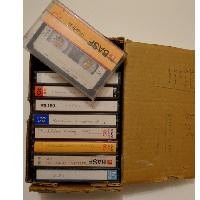Margita Múčková and her brother actively helped to spread the Gospel on the territory of Slovakia from 1970 onward. Múčková devoted herself to the transcription of samizdats and Christian literature and to their further dissemination. She co-organized secret meetings of young Christian couples and families, as well as spiritual exercises. The purpose of the activities of this secret church network was to raise children in a different spirit than that of the prevailing communist ideology. The collection contains, in particular, spiritual literature, photographs, and audio recordings of secret meetings.
-
Vieta:
-
Nová Dedinka 1062, Slovakia 900 29
-
Temos:
-
Įkūrimo data:
-
Charakteringi eksponatai:
The Kropyvnytskyi archive is a private collection of documents related to the activities of the Kyiv Art Institute in the second half of the 1920s. The institute's rector, Ivan Vrona, appointed Marian Kropyvnytskyi an assistant for the research office of the experimental visual arts, headed by the avant-garde painter Kazimir Malevich. Kropyvnytskyi served as Malevich's personal assistant in 1928-1930. The archive contains minutes of meetings, Kropyvnytskyi's notes of Malevich's lectures, and copies of Malevich's unpublished lectures. Since the archive of the Institute was destroyed, the Kropyvnytskyi collection is probably the only collection that contains documents about the Institute's history in the interwar period.
-
Vieta:
-
Kyiv Khreschatyk Street 15, Ukraine
-
Temos:
-
Įkūrimo data:
-
Charakteringi eksponatai:
The Marian Zulean personal collection is an illustration of the fact that any act of cultural opposition is dependent on the societal context that generates it. It implicitly highlights the fundamental difference between Romania and other communist states in the last years of the period 1980–1989. The more than 400 newspapers, magazines, brochures and books, originating especially from the Soviet Union in the Gorbachev period, epitomise a reformist political discourse that had become relatively official in the rest of the Soviet bloc, but was considered dangerous by the Romanian Securitate.
-
Vieta:
-
București Bd. Unirii 88, Romania
-
Temos:
-
Įkūrimo data:
-
Charakteringi eksponatai:
The collection contains illegal recordings of original and cover versions of spirituals, gospel music and other songs circulated as part of the underground Christian movement in various religious denominations of the Catholic Church, the Lutheran Church and the Baptist Church. They reinvigorated the activities of the Blue Cross movement in Switzerland and of the Association of Christians in Prague. The albums were secretly recorded and distributed to the youth on cassettes (currently on CDs) and represented an opposition against the “conscious atheist socialist man”.
-
Vieta:
-
Dukelská 821/4 958 01, Partizánske, Slovakia
-
Temos:
-
Įkūrimo data:
-
Charakteringi eksponatai:
The collection contains documents of the Masaryk Society, citizens' illegal initiatives, which originated in Brno and Prague in 1988. The society organized events for the return of Masaryk's name to the public space and cultivated the regime of suppressed knowledge and awareness of the philosopher and first president of Czechoslovakia, Tomas Garrigue Masaryk.
-
Vieta:
-
Žerotínovo náměstí 449/3, 602 00 Brno, Czech Republic
-
Temos:
-
Įkūrimo data:
-
Charakteringi eksponatai:




